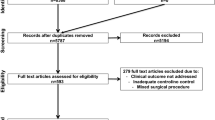Abstract
Introduction
Anastomotic leakage is a serious complication after colorectal resection. Recent studies suggest that nonsteroidal anti-inflammatory drugs may increase the risk of anastomotic leakage. We investigated this association in our enhanced recovery population.
Material and Methods
Patients undergoing an elective colon or rectal resection with primary anastomosis because of malignancy and treated within our enhanced recovery program were included. Univariable and multivariable logistic regression analyses were used to study risk factors for anastomotic leakage.
Results
Between 2006 and 2013, 856 patients were included. The anastomotic leakage rate was significantly higher in the group that received nonsteroidal anti-inflammatory drugs compared to patients who did not: 9.2 vs. 5.3 %, p = 0.038. This higher rate was only seen in patients receiving diclofenac: for colonic resections, 11.8 vs. 6.0 %, p = 0.016; for rectal resections, 13.1 vs. 0 %, p = 0.017. Only male sex (odds ratio 2.20, p = 0.005) was also independently associated with anastomotic leakage.
Conclusion
The results of this study are in line with other comparable studies in the literature, showing an increased risk for anastomotic leakage with diclofenac. The use of diclofenac in colorectal surgery can no longer be recommended. Alternatives for postoperative analgesia need to be explored within an enhanced recovery program.


Similar content being viewed by others
References
Bakker IS, Grossmann I, Henneman D, Havenga K, Wiggers T. Risk factors for anastomotic leakage and leak-related mortality after colonic cancer surgery in a nationwide audit. Br J Surg 2014: 101; 424–32.
Pommergaard HC, Gessler B, Burcharth J, Angenete E, Haglind E, Rosenberg J. Preoperative risk factors for anastomotic leakage after resection for colorectal cancer: a systematic review and meta-analysis. Colorectal Dis 2014.
Kube R, Mroczkowski P, Granowski D, Benedix F, Sahm M, Schmidt U et al. Anastomotic leakage after colon cancer surgery: a predictor of significant morbidity and hospital mortality, and diminished tumour-free survival. Eur J Surg Oncol 2010: 36; 120–24.
Klein M, Gogenur I, Rosenberg J. Postoperative use of non-steroidal anti-inflammatory drugs in patients with anastomotic leakage requiring reoperation after colorectal resection: cohort study based on prospective data. BMJ 2012: 345; e6166.
Mirnezami A, Mirnezami R, Chandrakumaran K, Sasapu K, Sagar P, Finan P. Increased local recurrence and reduced survival from colorectal cancer following anastomotic leak: systematic review and meta-analysis. Ann Surg 2011: 253; 890–99.
Boccola MA, Buettner PG, Rozen WM, Siu SK, Stevenson AR, Stitz R et al. Risk factors and outcomes for anastomotic leakage in colorectal surgery: a single-institution analysis of 1576 patients. World J Surg 2011: 35; 186–95.
McDermott FD, Heeney A, Kelly ME, Steele RJ, Carlson GL, Winter DC. Systematic review of preoperative, intraoperative and postoperative risk factors for colorectal anastomotic leaks. Br J Surg 2015: 102; 462–79.
Sultan R, Chawla T, Zaidi M. Factors affecting anastomotic leak after colorectal anastomosis in patients without protective stoma in tertiary care hospital. J Pak Med Assoc 2014: 64; 166–70.
Varadhan KK, Lobo DN, Ljungqvist O. Enhanced recovery after surgery: the future of improving surgical care. Crit Care Clin 2010: 26; 527–47, x.
Varadhan KK, Neal KR, Dejong CH, Fearon KC, Ljungqvist O, Lobo DN. The enhanced recovery after surgery (ERAS) pathway for patients undergoing major elective open colorectal surgery: a meta-analysis of randomized controlled trials. Clin Nutr 2010: 29; 434–40.
Holte K, Andersen J, Jakobsen DH, Kehlet H. Cyclo-oxygenase 2 inhibitors and the risk of anastomotic leakage after fast-track colonic surgery. Br J Surg 2009: 96; 650–54.
Gorissen KJ, Benning D, Berghmans T, Snoeijs MG, Sosef MN, Hulsewe KW et al. Risk of anastomotic leakage with non-steroidal anti-inflammatory drugs in colorectal surgery. Br J Surg 2012: 99; 721–27.
Bhangu A, Singh P, Fitzgerald JE, Slesser A, Tekkis P. Postoperative Nonsteroidal Anti-inflammatory Drugs and Risk of Anastomotic Leak: Meta-analysis of Clinical and Experimental Studies. World J Surg 2014.
Rushfeldt CF, Sveinbjornsson B, Soreide K, Vonen B. Risk of anastomotic leakage with use of NSAIDs after gastrointestinal surgery. Int J Colorectal Dis 2011: 26; 1501–09.
Klein M, Andersen LP, Harvald T, Rosenberg J, Gogenur I. Increased risk of anastomotic leakage with diclofenac treatment after laparoscopic colorectal surgery. Dig. Surg 2009: 26; 27–30.
Antman EM, Bennett JS, Daugherty A, Furberg C, Roberts H, Taubert KA. Use of nonsteroidal antiinflammatory drugs: an update for clinicians: a scientific statement from the American Heart Association. Circulation 2007: 115; 1634–42.
Dajani EZ, Islam K. Cardiovascular and gastrointestinal toxicity of selective cyclo-oxygenase-2 inhibitors in man. J Physiol Pharmacol 2008: 59 Suppl 2; 117–33.
Kearney PM, Baigent C, Godwin J, Halls H, Emberson JR, Patrono C. Do selective cyclo-oxygenase-2 inhibitors and traditional non-steroidal anti-inflammatory drugs increase the risk of atherothrombosis? Meta-analysis of randomised trials. BMJ 2006: 332; 1302–08.
Trelle S, Reichenbach S, Wandel S, Hildebrand P, Tschannen B, Villiger PM et al. Cardiovascular safety of non-steroidal anti-inflammatory drugs: network meta-analysis. BMJ 2011: 342; c7086.
Garcia Rodriguez LA, Tacconelli S, Patrignani P. Role of dose potency in the prediction of risk of myocardial infarction associated with nonsteroidal anti-inflammatory drugs in the general population. J Am Coll Cardiol 2008: 52; 1628–36.
Kotagal M, Hakkarainen TW, Simianu VV, Beck SJ, Alfonso-Cristancho R, Flum DR. Ketorolac Use and Postoperative Complications in Gastrointestinal Surgery. Ann Surg 2015.
Author information
Authors and Affiliations
Corresponding author
Rights and permissions
About this article
Cite this article
Bakker, N., Deelder, J.D., Richir, M. et al. Risk of anastomotic leakage with nonsteroidal anti-inflammatory drugs within an enhanced recovery program. J Gastrointest Surg 20, 776–782 (2016). https://doi.org/10.1007/s11605-015-3010-1
Received:
Accepted:
Published:
Issue Date:
DOI: https://doi.org/10.1007/s11605-015-3010-1




